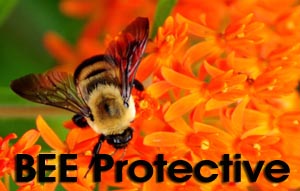Washington, DC–(ENEWSPF)–March 20, 2014 —Today, more than 500,000 signatures were delivered to U.S. Environmental Protection Agency (EPA) Administrator Gina McCarthy, urging the nation’s top-ranking environmental leader to protect bees and other pollinators. The date marks the one-year anniversary of the lawsuit filed against EPA by beekeepers, food, and environmental groups, including Beyond Pesticides, over the continued allowance of two bee-toxic pesticides: clothianidin and thiamethoxam. It also marks the two-year anniversary of the emergency legal petition filed against the agency on this same issue. EPA has yet to take serious action to address dramatic bee declines.
 The pesticides in question are a class of systemic insecticides known as neonicotinoids. Despite numerous studies linking neonicotinoids with bee kills, colony collapse, and weakened immune systems, EPA continues to operate under an alarmingly slow registration review process for these insecticides, one that extends to 2018. Honey bees are responsible for producing one in every three bites of food we eat, but research increasingly shows they are being harmed by the indiscriminate use of neonicotinoids, both alone and in combination with other pesticides. It is the job of the EPA to review such pesticides for safety and to take action if they are found to be harmful.
The pesticides in question are a class of systemic insecticides known as neonicotinoids. Despite numerous studies linking neonicotinoids with bee kills, colony collapse, and weakened immune systems, EPA continues to operate under an alarmingly slow registration review process for these insecticides, one that extends to 2018. Honey bees are responsible for producing one in every three bites of food we eat, but research increasingly shows they are being harmed by the indiscriminate use of neonicotinoids, both alone and in combination with other pesticides. It is the job of the EPA to review such pesticides for safety and to take action if they are found to be harmful.
“We call on EPA Administrator McCarthy to lead the agency in a new direction by immediately suspending all outdoor uses of neonicotinoid pesticides. Bees can’t wait four more years for EPA to make a decision. If the agency acts now, we can save these vital pollinators before it’s too late,” said the groups in a joint statement.
“Beekeepers are losing colonies at an unprecedented rate – the losses are too extreme to keep up with, and our entire industry is at risk of collapse unless federal action is taken. Convening conferences and changing pesticide labels is lip service and window dressing to the issue, but has no substance,” said New York beekeeper Jim Doan, a plaintiff in the lawsuit who will be discussing bee declines on Capitol Hill next week.
In the absence of federal action, several states have taken action independently to introduce legislation that would suspend uses of neonicotinoids. California, Minnesota and New York are among the states considering action in their state legislatures. And this month, Eugene, Oregon became the first city in the country to ban the use of neonicotinoids on city property. Congress is also pushing to curb the use of neonicotinoids through the Saving America’s Pollinators Act, introduced by Representatives John Conyers (D-MI) and Earl Blumenauer (D-OR).
In December 2013, Europe implemented a two-year moratorium on the most problematic neonicotinoids in order to protect bee health. This move came after several European countries had already implemented bans, with no economic costs to farmers or consumers.
“We are asking EPA to follow the EU’s lead and recognize that the risks are unacceptably high. Pollination services provided by honey bees and other, even less studied, wild bees are far too important for agriculture and ecosystems to treat them in a non-precautionary manner. Many thousands of beekeeper livelihoods, the future viability of commercial beekeeping and the crops relying on these pollination services, estimated at $20-30 billion annually, are potentially in jeopardy,” said the groups.
Beyond Pesticides along with other groups will continue to push for pollinator protections. Please visit Beyond Pesticides’ Bee Protective website to learn more about our efforts to save pollinators and what you can do too. Beyond Pesticides launched the BEE Protective campaign, a national public education effort supporting local action aimed at protecting honey bees and other pollinators from pesticides and contaminated landscapes. BEE Protective includes a variety of educational materials to help encourage municipalities, campuses, and individual homeowners to adopt policies and practices that protect bees and other pollinators from harmful pesticide applications and create pesticide-free refuges for these beneficial organisms. In addition to scientific and regulatory information, BEE Protective also includes a model community pollinator resolution and a pollinator protection pledge. Pollinators are a vital part of our environment and a barometer for healthy ecosystems. Let’s all do our part to BEE Protective of these critical species.
All unattributed positions and opinions in this piece are those of Beyond Pesticides.
Source: http://www.beyondpesticides.org








